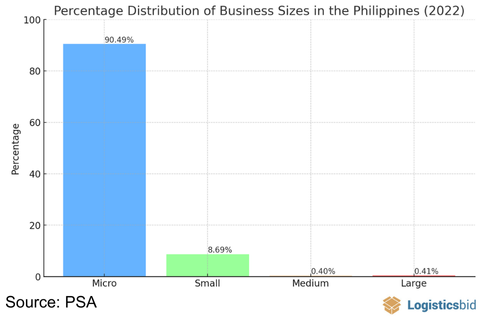
The 2022 List of Establishments (LE) of the Philippine Statistics Authority (PSA) recorded a total of 1,109,684 business enterprises operating in the country. Of these, 1,105,143 (99.59%) are MSMEs and 4,541 (0.41%) are large enterprises. Micro enterprises constitute 90.49% (1,004,195) of total establishments, followed by small enterprises at 8.69% (96,464) and medium enterprises at 0.40% (4,484).
 |
Small medium enterprises are very much exposed and aware of logistics opportunities and for possible setbacks. They frequently battle with issues like last-minute changes, high delivery fees, and ensuring they have the appropriate stock on hand for busy times of the year.
These issues have the potential to severely hinder business growth and complicate daily operations. SO in this article, we will find ways to take on these challenges head-on if we are to support the success of these businesses.
What Challenges Do Small Medium Enterprises (SMEs) Face in Logistics?
Small and medium-sized enterprises (SMEs) are impacted by the following challenges, which are typically caused by a combination of supply chain management complexities, external events, and internal resources.
-
Supply Chain Disruptions
Global epidemics, natural disasters, and geopolitical crises can all have a significant effect on business logistics operations. To deal with these disruptions, SMEs must create backup plans, diversify their suppliers, and set up alternative routes for distribution.
-
Inventory Management Challenges
Maintaining the ideal stock levels to satisfy consumer demand while minimizing carrying costs is a common challenge for small and medium-sized businesses. These problems can be helped by advanced inventory management systems, but smaller businesses may find it difficult to afford the initial investment and continuing management.
-
Time Pressure and Mistakes
Quick market entry necessitates careful attention to logistical issues, yet many SMEs fail to do so, which results in expensive mistakes in inventory control and delivery.
-
Outsourcing Logistics Functions
To mitigate these risks, SMEs often choose to outsource their logistics opportunities to experienced providers. This strategy allows them to focus on their core business operations while relying on experts for inbound components, returns, and outbound finished products.
-
High Transportation Costs
Escalating transportation costs driven by fluctuating fuel prices, labor shortages, and heightened demand for delivery services are pressing concerns for SMEs.
-
Quality Control and Customer Satisfaction
Small medium enterprises face challenges in ensuring that products are delivered safely and meet customer expectations. A robust quality control process can mitigate these risks, but implementing such measures may stretch the limited resources of smaller enterprises.
-
Real-Time Visibility
Without accurate information about the status and location of goods in transit, SMEs find it challenging to make informed decisions.
What Strategies Can Unlock Logistics Opportunities for SMEs?
-
Optimizing Warehouse Management
For small medium enterprises (SMEs) looking to enhance their logistics operations, implementing warehouse management systems can provide real-time visibility into stock levels and streamline processes, which helps in reducing order picking mistakes and misplaced inventory.
-
Leveraging Technology
Advanced technologies such as AI, data analysis, and RFID systems can significantly streamline logistics opportunities for SMEs. By leveraging these tools, businesses can better navigate challenges like inventory management during peak seasons, thus optimizing supply chain efficiency.
-
Emphasizing Sustainability
Sustainability has emerged as a critical focus in logistics like those in franchise business, especially for SMEs aiming to reduce their environmental impact. Implementing green packaging materials, optimizing transportation routes, and collaborating with eco-friendly suppliers are effective strategies for achieving sustainability.
-
Diversifying Supply Chain Partnerships
Building a mixed supply chain by collaborating with multiple suppliers and logistics companies can make SMEs more resilient. Additionally, long-term strategic partnerships with logistics providers can optimize resource allocation and drive innovation in logistics processes, ensuring sustained growth and efficiency.
-
Continuous Improvement and Feedback Loops
Encouraging feedback from partners can lead to continuous improvement in logistics operations, helping SMEs adapt to changing market conditions and customer expectations. Regular assessments and optimizations of the supply chain network for efficiency and reliability will be crucial for long-term success.
What Are the Future Trends in Logistics for SMEs?
Technological Integration and Industry 4.0
The logistics opportunities for small medium enterprises is evolving rapidly, driven by the integration of Industry 4.0 technologies. The adoption of advanced tools such as big data, artificial intelligence, and machine learning is expected to enhance operational efficiency and provide SMEs with a competitive advantage.
Enhanced Supply Chain Practices
The implementation of automation and strategic partnerships with third-party logistics (3PL) providers allows SMEs to optimize their logistics operations and better respond to market demands. Also, fostering a culture of continuous improvement enables SMEs to adapt quickly to changing conditions and maintain their competitive edge.
Personalization and Customer-Centric Logistics
As e-commerce continues to grow, SMEs must focus on providing personalized logistics services that cater to their customers’ specific needs. This includes developing flexible delivery options and ensuring that logistics systems are embedded across all SME business functions, from inventory management to customer service.
Future Challenges and Opportunities
While the logistics sector offers numerous opportunities for SMEs, it also presents significant challenges, such as rising operational costs and complex delivery demands. To thrive in this dynamic environment, SMEs must continuously innovate and adapt their logistics strategies.
By investing in technology, improving communication with suppliers, and embracing new business models, small medium enterprises can position themselves for long-term success in the logistics domain.
Which Logistics Companies Are Best Suited for Small Medium Enterprises (SMEs)?
Logistics companies enable small and medium enterprises (SMEs) to expand their operational capabilities, reach wider markets, and enhance efficiency. Here’s a look at how various logistics providers are offering unique opportunities to SMEs:
1. FedEx; Global Reach with Precision
 |
FedEx is renowned for its global logistics capabilities, providing SMEs with access to international markets through a vast and reliable shipping network. FedEx offers tailored solutions that include export and import services, critical inventory logistics, and temperature-controlled transportation, helping SMEs to participate in global trade effectively.
Key Opportunities for SMEs:
- Global Network: FedEx’s extensive network allows SMEs to ship products across borders with ease and reliability.
- Specialized Services: From temperature-controlled logistics to secure transportation of high-value items, FedEx caters to specific industry needs, which is crucial for SMEs in sectors like pharmaceuticals and luxury goods.
- E-commerce Integration: FedEx integrates with major e-commerce platforms, providing SMEs seamless logistics solutions that include fulfillment and returns management.
2. UPS: Customized and Integrated Solutions
 |
UPS is another major player that supports SMEs by offering comprehensive logistics services that integrate with existing business systems. Their range of services includes everything from standard parcel delivery to complex supply chain management.
Key Opportunities for SMEs:
- Advanced Technology: UPS leverages advanced technologies like AI and blockchain for enhanced tracking and management of shipments, increasing the logistics reliability for SMEs.
- Sustainability Focus: UPS offers carbon-neutral shipping options and eco-friendly packaging solutions, helping SMEs align with sustainability goals.
- Flexible Delivery Options: UPS provides a variety of delivery timings, including same-day deliveries in certain areas, catering to the dynamic needs of SMEs.
3. DHL: Expertise in International Logistics
 |
DHL specializes in international shipping and logistics solutions, making it a preferred choice for SMEs looking to expand abroad. DHL’s expertise in customs, international trade regulations, and global logistics networks provides SMEs with the confidence to explore new markets.
Key Opportunities for SMEs:
- Customs Expertise: DHL helps SMEs navigate complex customs procedures, reducing the risk of delays and penalties.
- Sector-Specific Solutions: DHL offers solutions tailored to industries such as technology, fashion, and life sciences, which require specific logistics services.
- International Growth: DHL’s strong presence in emerging markets provides SMEs opportunities to explore new customer bases.
4. Lalamove: Instant Local Deliveries
 |
Lalamove excels in providing on-demand and same-day delivery services within local areas, making it ideal for SMEs that need fast, reliable local deliveries. Its mobile platform enables quick booking of delivery services.
Key Opportunities for SMEs:
- Rapid Delivery Services: Lalamove’s ability to deliver within an hour can be particularly beneficial for SMEs dealing with time-sensitive goods.
- Scalable Operations: Whether it’s a single document or multiple large packages, Lalamove can handle a variety of delivery sizes at short notice.
- Cost-Effective Pricing: With competitive pricing based on distance and vehicle type, SMEs can control their logistics costs more effectively.
5. Transportify: Extensive Local Coverage
 |
Transportify offers a wide range of vehicle options and extensive local coverage, ideal for SMEs that require flexible and reliable logistics services within the country. Transportify’s app-based platform facilitates easy booking and real-time tracking of deliveries.
Key Opportunities for SMEs:
- Flexible Vehicle Options: From motorcycles to large trucks, SMEs can choose the right vehicle size for their delivery needs without investing in a fleet.
- Business Program Perks: Features like scheduled deliveries, multiple drop-off points, and cash on delivery options are advantageous for SMEs.
- Real-Time Tracking: Enhanced visibility into the delivery process helps SMEs manage their supply chains more effectively.
Each of these logistics companies offers distinct advantages that can help SMEs overcome traditional barriers to market entry and expansion, optimize their operations, and focus on their core business growth. By selecting the right logistics partner, SMEs can not only enhance their operational efficiency but also gain a competitive edge in the marketplace.
